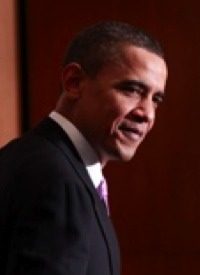
It’s getting harder and harder these days for a President of the United States to be hawkish enough to please the proponents of perpetual, worldwide military interventions. President Barack Obama winner of last year’s Nobel Peace Prize, is currently waging war in five countries (Iraq Afghanistan, Pakistan, Yemen, and Somalia) and has at least hinted at a possible nuclear first strike on Iran if that country attempts to produce nuclear weapons of its own. Yet former New York Mayor Ed Koch worries about Obama’s "appeasement" and detects "a foul whiff of appeasement" in the air.
"I fear that we have lost the battle and lost our nerve," Koch wrote Monday in his column on Newsmax.com. "It appears the Obama administration has decided to live with the idea that these two rogue states — North Korea and Iran — can do as they please on the nuclear front."
Yet Obama has developed new guidelines on the potential use of nuclear weapons that appear to leave open the possibility of an attack on Iran over its alleged weapons program. The President has ruled out a nuclear strike against non-nucelar states that are in compliance with he Nuclear Nonproliferation Treaty, even if they attacked the United States with chemical and biological weapons or launched a cyber attack, according to the New York Times. Yet Obama said he was making exceptions for "outlier states like Iran and North Korea" that are either in violation of, or have renounced, the treaty.
North Korea, which tested a nuclear bomb in 2006 and another one last year, has withdrawn from the treaty, while Iran remains a signatory, despite declarations by the United Nations Security Council that it has violated its obligations by hiding its nuclear plants and refusing to answer questions about its reported work on a nuclear warhead. Iran has denied that it is pursuing nuclear weapons and has insisted its nuclear facilities are for the commercial generation of electricity and the production of radioisotopes for agriculture or medicine. An international Atomic Energy Agency report earlier this year found that Iran had produced a small batch of uranium enriched to a higher purity, a sign that Tehran may be moving toward an enrichment level capable of detonating a nuclear bomb.
"I think that the international community has a strong sense of what it means to pursue civilian nuclear energy for peaceful purposes versus a weaponizing capability," Obama said in an interview on Monday. The Obama administration is seeking a new round of United Nations sanctions against Iran, though the President was not optimistic that even a sanctions resolution "that has bite" will have the desired effect. "We’re not naïve that any single set of sanctions automatically is going to change Iranian behavior," he said.
Obama described his strategy as one of making nuclear weapons obsolete. It renounces the development of any new nuclear weapons, going against the position initially taken by Secretary of Defense Robert Gates, the Times reported. Gates said at a press conference on Tuesday that any non-nuclear nation that used weapons of mass destruction against the United States would still "face the prospect of a devastating conventional military response."
But if the goal is to create a safer more peaceful world, it may seem strange to rule out a nuclear strike against a country that attacks us with chemical or biological weapons, while reserving the possibility of "nuking" a nation merely for developing nuclear weapons of its own. The idea is not new with Obama, however. During a presidential candidates debate at Saint Anselm College in New Hampshire in June of 2007, U.S. Rep. Ron Paul of Texas was the only one among 10 Republican candidates willing to rule out the possibility of a nuclear first strike against Iran to prevent that nation from developing a nuclear bomb. When asked what he believed was the most pressing moral issue facing the United States, Paul said:
I think it is the acceptance just recently that we now promote pre-emptive war. I do not believe that’s part of the American tradition. We in the past have always declared war in the defense of our liberties or go to aid somebody, but now we have accepted the principle of preemptive war. We have rejected the just- war theory of Christianity. And now, tonight, we hear that we’re not even willing to remove from the table a pre-emptive nuclear strike against a country that has done no harm to us directly and is no threat to our national security!
We have to come to our senses about this issue of war and pre-emption and go back to traditions and our Constitution and defend our liberties and defend our rights, but not to think that we can change the world by force of arms and to start wars.
Photo: AP Images



